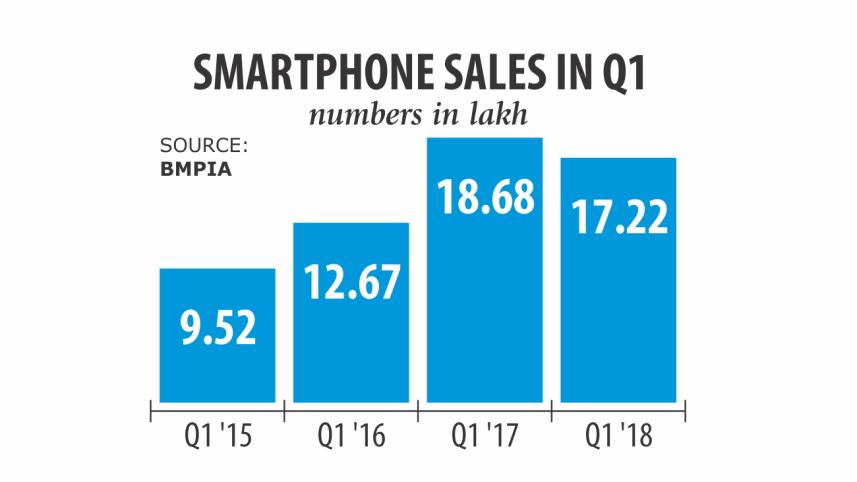Smartphone sales drop 8pc

Smartphone sales fell 8 percent year-on-year to 17.22 lakh units in the first quarter this year thanks to a drastic fall in import of low-end devices.
Overall mobile phone imports also fell 1.14 percent year-on-year to 79.74 lakh units in the three months to March.
Despite the fall in the import amount, the value of the sets that were brought in has increased by 6.90 percent year-on-year to Tk 1,604 crore due to the customers' shift to high-end products.
The industry has experienced the negative sales growth at a time when the number of 4G handset users is increasing by the day, top mobile phone importers said.
Imports of handsets priced less than Tk 3,000 decreased about 90 percent to 18,500 units in the January-March period, according to a report of Bangladesh Mobile Phone Importers Association.
Import of phones with price tags ranging from Tk 3,000 to Tk 4,500 also fell by 42 percent, according to the report.
Counterpoint Research, a market research firm based in India, also confirmed the number. It, however, said the demand for 4G-enabled smartphones will pick up in the coming quarters with the expansion of the network coverage. Imports of handsets costing over Tk 20,000 saw a 61 percent rise while phones worth between Tk 4,500 and Tk 6,000 grew 58 percent. People now switch to high-end smartphones to use more mobile applications, said Jakaria Shahid, managing director of Edison Group, the parent company of market leader handset vendor Symphony.
Shahid said internet users now look for bigger screens, which give a good visual experience for browsing videos, making the four-inch monitor almost obsolete.
The bigger screens also help customers to enjoy better quality internet, said Shahid, also the general secretary of the BMPIA.
Top local and international brands alike were affected by the drop in sales.
However, Chinese handset maker Itel recorded a 564 percent year-on-year sales growth in the first quarter, capturing 10 percent market share.
The company has already established a mobile phone assembly plant in the country, said Rezwanul Haque, CEO of Transsion Bangladesh Ltd, owner of Itel. “The price of Itel-branded products will further decline, as soon as the plant starts rolling.”
As of April, the number of active mobile internet connections hit 8.01 crore and about 47 lakh new connections were added to the network in the last three months.
In the country, around three crore active smartphones use eight crore SIMs that are connected with the internet, said Mahmud Hossain, chief corporate affairs officer of Grameenphone.
“There are a huge number of people who still use feature phones to get access to internet,” said Hossain.
He said mobile phone operators have requested the government to reduce the tax on handset imports—which is 31 percent now—for the sake of digitisation.
The higher import tax has encouraged some companies to start assembling handsets in the country. One such plant has already started operations.



 For all latest news, follow The Daily Star's Google News channel.
For all latest news, follow The Daily Star's Google News channel.
Comments